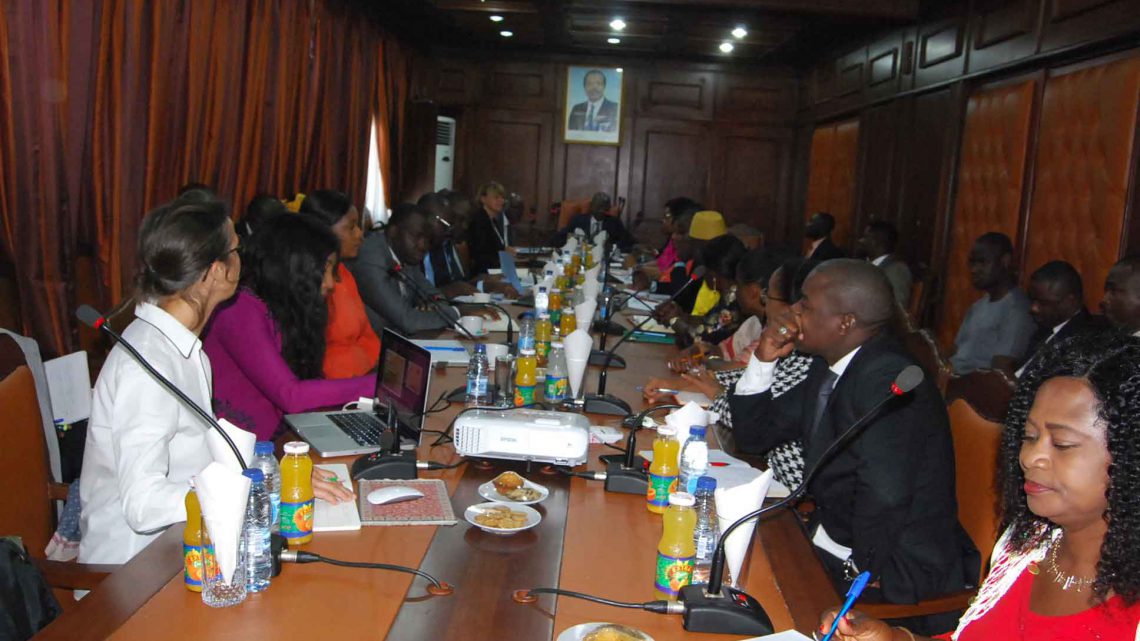Published on : 5/05/21 3:33 AM

Under the supervision of the Minister of Public Service and Administrative Reform, Joseph LE and the technical coordination of Mr. TCHAGADICK NJILLA Yves Alain, Permanent Secretary for Administrative Reform, was held from 03 to 04 September 2020 at the Bengo Hotel in Ebolowa, a workshop for the revision of the Methodological Guide for the elaboration of Organizational Frameworks and its experimentation in ten (10) pilot Ministries.
In addition to the officials of the Ministry of Public Service and Administrative Reform (MINFOPRA), those of the Ministry of Finance and representatives of ten (10) ministerial departments (MINESUP, MINMAP, MINT, MINSEP, MINPROFF, MINTOUL, MINMIDT, MINPMEESA, MINEFOP and MINPOSTEL) attended.
Two important moments marked these conferences, notably the protocol phase and the work itself around the following points:
The Minister of Public Service, during his speech, first expressed his joy to open the said works. He praised the efforts made by the local authorities and expressed his gratitude to the Mayor of Ebolowa.
Continuing his remarks, as part of the promotion of the performance culture, which translates into the desire to improve the State’s action in an effective and efficient manner through results-based management, MINFOPRA then noted that it is important for each head of a ministerial department to have an Organizational Framework. This tool for planning and rational management of resources aims at the optimal use of the skills of each person and a forward-looking management of staff. To this end, MINFOPRA has stressed the importance of harmonizing this Organizational Framework so that all Cameroonian public administrations have a coherent instrument that can be used by all ministerial departments.
In addition, Joseph Lé, Minister of the Civil Service and Administrative Reform, gave an update on some benchmarks in the framework of the implementation of the Global Plan of Public Finance Reforms 2019-2021, particularly in its axis that deals with the implementation of the tools of the workforce organization plan. To this end, the civil service is responsible for the recruitment and provision of human resources. Each year, a recruitment plan is updated, and takes into account the needs of the administrations before being transmitted to the Head of Government who makes arbitrations in order to meet the exact needs of the administrations, the Minister said.
In closing, MINFOPRA recalled that before being generalized to all other Cameroonian public administrations next year, the expected output of this workshop is to have a methodological guide for the elaboration of validated organizational frameworks.
As a prelude to the actual work in the workshop, two presentations were made, namely: a brief presentation of the Global Plan for Public Financial Management Reforms (PGRGFP) 2019-2021 and the presentation of the Methodological Guide for the Elaboration of Organizational Frameworks.
Regarding the PGRGFP 2019-2020, the presentation by Mr. BEKONO BEKONO Marc Désiré, Head of the Unit for Monitoring the Implementation of the Reform Partnership at the General Directorate of the Budget, aimed to better inform participants on the strategic anchoring, the strategic axes, the main results obtained, and the steering and financing mechanism of the PGRGFP 2019-2020. Specifically for MINFOPRA, the speaker noted that three (03) major activities to be implemented within the framework of the PGRGFP have been retained, namely the study on the dysfunctions of the organizations in force and the evaluation of the risks incurred in terms of inefficiency in the management of State personnel and pay; the study on the continuous training of officials responsible for the preparation, execution and monitoring of budget documents; and the activity relating to the continuity of the implementation of the tools of the Organizational and Staffing Plan, and the updating of the Organizational Frameworks.
Regarding the presentation of the Methodological Guide for the Elaboration of Organic Frameworks, given by Mrs. EBA’A née ZIBI Jeanne, Head of the Economic and Social Administration Division at MINFOPRA, the objective of this presentation was to better inform the participants on the methodological approach of the elaboration of the organic framework, and its presentation.
At the end of these presentations, the main point was the awareness and communication of the Organic Framework of Public Administrations. And it was noted that this tool is one of the levers of steering in the context of decision-making by the heads of ministerial departments.
The last point of this work was the testing of the methodological guide of the Organic Framework in the ten pilot administrations mentioned above. In addition, the SPRA’s Organic Framework projects were reviewed. Particular attention was paid to the profiles of the workstations of the technical departments related to the professions of each of these administrations, as well as to the number of staff in the reference work units.
At the end of this work, it was recommended to the pilot administrations to contact MINFOPRA by mail, so that a team from SPRA could accompany these administrations in the elaboration of new drafts of the Organic Text. This would make it possible to better address or take into account the new constraints of the legal and managerial environment as well as the erection of new operational structures whose management modalities have often not been clarified, following the example of the new sports complexes of Japoma and Olembé.